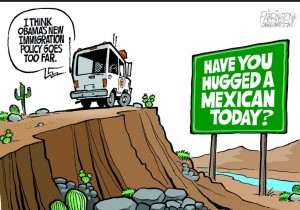Ian Baruma writes: The British shadow minister for Europe, Pat McFadden, recently warned members of his Labour Party that they should try to make the most of the global economy and not treat immigration like a disease. As he put it, “You can feed on people’s grievances or you can give people a chance.”
In a world increasingly dominated by grievances – against immigrants, bankers, Muslims, “liberal elites,” “Eurocrats,” cosmopolitans, or anything else that seems vaguely alien – such wise words are rare. Leaders worldwide should take note.
In the United States, Republicans are threatening to close the government down just because President Barack Obama has offered undocumented immigrants who have lived and worked in the US for many years a chance to gain citizenship. The United Kingdom Independence Party (UKIP) wants to introduce a five-year ban on immigration for permanent settlement. Russia’s deputy prime minister, Dmitry Rogozin, once released a video promising to “clean the rubbish” – meaning migrant workers, mostly from former Soviet republics – “away from Moscow.” Even the once famously tolerant Dutch and Danes are increasingly voting for parties that fulminate against the scourge of immigration.
Retaining one’s job in a tightening economy is undoubtedly a serious concern. But the livelihoods of most of the middle-aged rural white Americans who support the Tea Party are hardly threatened by poor Mexican migrants. UKIP is popular in some parts of England where immigrants are rarely seen. And many of the Dutch Freedom Party’s voters live nowhere near a mosque.
Anti-immigrant sentiment cuts across the old left-right divide. One thing Tea Party or UKIP supporters share with working-class voters who genuinely fear losing their jobs to low-paid foreigners is anxiety about being left behind in a world of easy mobility, supranational organizations, and global networking. On the right, support for conservative parties is split between business interests that benefit from immigration or supranational institutions, and groups that feel threatened by them. On the left, opinion is split between those who oppose racism and intolerance above all and those who want to protect employment and preserve “solidarity” for what is left of the native-born working class.
It would be a mistake to dismiss anxiety about immigration as mere bigotry or apprehension about the globalized economy as simply reactionary. In the new global economy, there are clear winners and losers. Educated men and women who can communicate effectively in varied international contexts are benefiting. People who lack the needed education or experience – and there are many of them – are struggling.
In other words, the new class divisions run less between the rich and the poor than between educated metropolitan elites and less sophisticated, less flexible, and, in every sense, less connected provincials.
Populist rabble-rousers like to stir up such resentments by ranting about foreigners who work for a pittance or not at all. But it is the relative success of ethnic minorities and immigrants that is more upsetting to indigenous populations. This explains the popular hostility toward Obama. Americans know that, before too long, whites will be just another minority, and people of color will increasingly be in positions of power.
Economic globalization cannot be undone. But regulation can and should be improved. After all, some things are still worth protecting. There are good reasons not to leave culture, education, lifestyles, or jobs completely exposed to the creative destruction of market forces.

